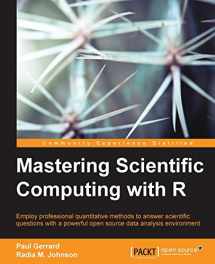
Mastering Scientific Computing With R: Employ Professional Quantitative Methods to Answer Scientific Questions With a Powerful Open Source Data Analysis Environment
Book details
Summary
Description
Employ professional quantitative methods to answer scientific questions with a powerful open source data analysis environment
About This Book- Perform publication-quality science using R
- Use some of R's most powerful and least known features to solve complex scientific computing problems
- Learn how to create visual illustrations of scientific results
If you want to learn how to quantitatively answer scientific questions for practical purposes using the powerful R language and the open source R tool ecosystem, this book is ideal for you. It is ideally suited for scientists who understand scientific concepts, know a little R, and want to be able to start applying R to be able to answer empirical scientific questions. Some R exposure is helpful, but not compulsory.
What You Will Learn- Master data management in R
- Perform hypothesis tests using both parametric and nonparametric methods
- Understand how to perform statistical modeling using linear methods
- Model nonlinear relationships in data with kernel density methods
- Use matrix operations to improve coding productivity
- Utilize the observed data to model unobserved variables
- Deal with missing data using multiple imputations
- Simplify high-dimensional data using principal components, singular value decomposition, and factor analysis
With this book, you will learn not just about R, but how to use R to answer conceptual, scientific, and experimental questions.
Beginning with an overview of fundamental R concepts, you'll learn how R can be used to achieve the most commonly needed scientific data analysis tasks: testing for statistically significant differences between groups and model relationships in data. You will delve into linear algebra and matrix operations with an emphasis not on the R syntax, but on how these operations can be used to address common computational or analytical needs. This book also covers the application of matrix operations for the purpose of finding structure in high-dimensional data using the principal component, exploratory factor, and confirmatory factor analysis in addition to structural equation modeling. You will also master methods for simulation and learn about an advanced analytical method.


We would LOVE it if you could help us and other readers by reviewing the book
Book review



